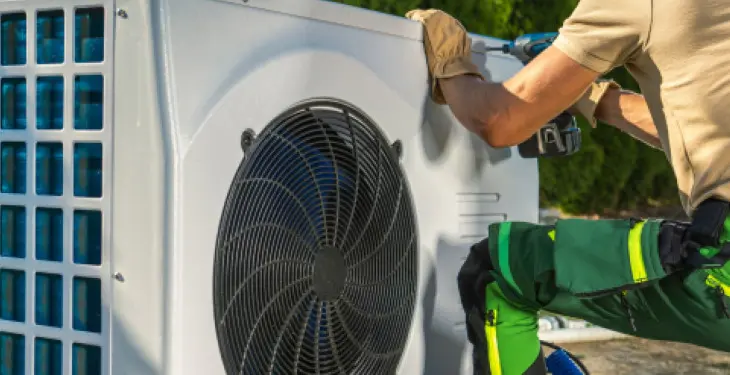

Written by Stephen Day
Gas Safe Engineer
Updated: 30th May, 2025
Welcome to iHeat, your trusted online boiler installation company! We are thrilled to introduce our latest offering - heat pumps! Join us on this blog to discover the world of heat pumps, their eco-friendly advantages, and how iHeat's innovative solutions can transform your heating experience. Get ready to embrace a greener, more efficient way of heating your home!
Get a new boiler quote, save up to £550 per year (0% APR available).
Heat pumps are an energy-efficient alternative to traditional heating and cooling systems, providing both warmth in the winter and cool air in the summer.
A well-maintained heat pump offers numerous benefits, including lower energy consumption, reduced greenhouse gas emissions, and increased cost savings.
However, it's crucial for homeowners to understand the importance of regular maintenance in order to maximise the efficiency and longevity of their heat pumps.
Heat pump maintenance costs range depending on the type, age, and condition of the unit. Regular maintenance typically includes tasks such as filter replacement, cleaning, and visual inspection of vital components.
Proper servicing by a professional technician is also necessary to address common issues and ensure optimal performance. By investing in regular maintenance, homeowners can save money in the long run and prolong the life of their heat pump systems.
It's important to note not every home is suited to a heat pump, a new boiler may be the best option for you!
Regular heat pump maintenance is crucial for ensuring the system operates efficiently and effectively. By maintaining your heat pump, you can reduce energy consumption and prolong the lifespan of the unit. Additionally, regular maintenance enables early detection and prevention of potential issues, ultimately resulting in cost savings by avoiding expensive repairs or premature replacement of your heat pump system.
An annual maintenance plan for your heat pump should include the following:
Filter inspection and cleaning: Check and clean the heat pump's filter regularly to ensure proper airflow and prevent the unit from working harder than necessary.
Outdoor unit inspection: Visually inspect the outdoor unit for debris, dirt, or obstructions that may affect its performance.
Thermostat check: Ensure that the thermostat is functioning correctly, and make any necessary adjustments.
Lubrication: Lubricate all moving parts to reduce wear and tear on the heat pump.
Electrical inspection: Examine electrical connections for signs of damage or wear, and tighten any loose connections.
Other tasks that may be performed during annual maintenance include inspecting the refrigerant level, ductwork, and defrost cycle.
While some heat pump maintenance tasks can be performed by the homeowners themselves, others may require professional help for optimal outcomes. Here's a comparison of DIY maintenance vs professional service:
DIY Maintenance: Homeowners can carry out simple tasks like filter cleaning, outdoor unit inspection, and thermostat checks. Conducting these tasks regularly can help save energy and improve the efficiency of your heat pump. Moreover, it promotes a safer and healthier living environment by preventing dust and allergens buildup in the system.
Professional Service: For more complex tasks or an exhaustive inspection, it's advisable to hire a qualified HVAC professional. They have the tools, knowledge, and experience to accurately assess your heat pump's condition and perform necessary repairs. Opting for professional maintenance services is important to ensure your system is running at peak performance and ensures compliance with warranty requirements in many cases.

It is essential to incorporate both DIY maintenance tasks and regular professional services when maintaining your heat pump. Prioritising the upkeep of your heat pump system is an investment in its long-term performance, efficiency, and your overall home comfort.
Find out more about heat pumps in our 2025 cost guide!
Maintaining your heat pump is essential for efficient operation and to extend its lifespan. This section will focus on the key components to check and maintain, ensuring your heat pump operates effectively and without issues. The subsections will cover Filters, Coils, Motors, Refrigerant, and Belts.
Regularly checking and replacing air filters is a crucial maintenance step. Dirty or clogged filters can reduce airflow, leading to decreased efficiency and an increased risk of overheating or system failure. It's essential to:
Check filters every month, particularly during heavy-use seasons.
Clean or replace filters as needed, at least every three months.
Indoor and outdoor coils require periodic inspection and cleaning. Dust, debris, and dirt buildup can hinder their ability to transfer heat effectively. To maintain coils:
Clean the outdoor unit and coil by removing debris, such as leaves and dirt, from the surrounding area.
Check indoor evaporator coils and clean them when necessary (usually once a year).
Schedule professional service annually to inspect and clean the coils thoroughly.
Heat pump motors play a significant role in maintaining consistent airflow within the system. It's essential to inspect and maintain motors properly:
Make sure fan motors are adequately lubricated to prevent overheating and ensure smooth operation.
Regularly inspect motors for signs of wear or damage, taking prompt action if issues arise.
Maintaining the correct refrigerant level is vital for the efficient operation of your heat pump. Improper levels can cause performance issues and damage the compressor. To maintain refrigerant:
Periodically check for refrigerant leaks, which can occur due to wear or damage.
Schedule professional servicing annually to verify appropriate refrigerant levels and fix any potential leaks.
Belts within the heat pump system ensure smooth operation of various components, including fans and motors. To maintain belts:
Inspect belts periodically for wear, cracks, or fraying.
Adjust belt tension as needed, ensuring they aren't too tight or too loose.
Replace worn or damaged belts promptly to prevent further issues.
In conclusion, regularly checking and maintaining these key components—filters, coils, motors, refrigerant, and belts—will not only improve the performance of your heat pump but also extend its lifespan and reduce the likelihood of costly repairs.
If you think a new combi boiler is better suited to your property check out our favourites here!
Regular cleaning is vital for maintaining your heat pump's efficiency and indoor air quality. Dust and dirt particles can accumulate on filters, causing your heat pump to work harder and consume more energy. Make sure to check air filters monthly and clean them as needed. Additionally, clean the outdoor unit to prevent debris from impacting overall performance.
Keep your heat pump running smoothly by ensuring its moving components are appropriately lubricated. Apply suitable lubricants to motors and bearings to reduce friction, extend the life of the heat pump, and maintain energy efficiency. Proper lubrication supports the heat pump in functioning seamlessly throughout all operational states, including the defrost cycle.
A properly functioning thermostat is essential for your heat pump to work efficiently and effectively. Test your thermostat regularly to ensure it is calibrated correctly and maintains the desired temperature. Consider upgrading to a programmable thermostat, which allows you to schedule specific temperature settings and optimise energy usage throughout the day.
Ensure your heat pump is operating safely by examining electrical connections. Loose or corroded connections can lead to system malfunctions, reduced efficiency, and potential hazards. It's crucial to check these connections regularly to prevent operational problems and maintain the heat pump's longevity.
A heat pump requires good airflow to perform optimally. Examine ducts for leaks, blockages, or damage that may restrict airflow. Properly sealed and insulated ducts improve efficiency and can reduce energy consumption by 10-25%. Remember to clean ducts and vents periodically to maintain a healthy indoor environment and enhance your heat pump's performance.
One common issue in heat pump systems is refrigerant leaks. When refrigerant levels are low, your heat pump's performance and efficiency will be reduced. It's essential to regularly inspect your heat pump for signs of leakage and to ensure that the refrigerant levels remain optimal. If you detect a leak, it is vital to have it repaired promptly, as low refrigerant levels can lead to expensive damage in your system.
Heat pumps are reliable and efficient HVAC systems, but they may experience minor problems that could escalate into major issues if not attended to in a timely manner. Regular maintenance is necessary to extend the life of your heat pump and decrease the chances of sudden breakdowns. The average heat pump repair cost is £550. When necessary, be prepared to replace components like the air handler, or eventually, the whole heat pump itself.
Maintaining your heat pump's performance and efficiency largely depends on the cleanliness and proper operation of the system. Remember to:
Check air filters monthly and clean as needed
Inspect the outdoor unit for dirt, debris, and any obstructions
Schedule annual servicing by a professional technician.
These steps will help ensure optimal energy consumption and prevent potential issues that could impact your heat pump's performance.
Unusual noises and vibrations from your heat pump system could indicate potential problems. Some common causes of these issues include:
Loose bolts or screws
Imbalanced fans or motors
Damaged or blocked ventilation ducts.
Identifying and addressing these issues early on can help prevent costly repairs or replacements in the future. Regular inspections and proper maintenance will mitigate the risks of noise and vibration-related malfunctions in your heat pump.
It is essential to regularly inspect and clean the outdoor coils of your heat pump. This includes removing any dirt, debris, and vegetation that may have accumulated around the unit. Maintaining clean supply and return registers in your home and straightening their fins if bent will also improve the efficiency of your heat pump. In the spring, scheduling a professional tune-up can ensure your heat pump is in prime condition, ready for the warmer months.
Understanding and managing energy costs is crucial for maintaining the efficiency of your heat pump. To optimise your heat pump's performance, set the thermostat at one temperature and avoid frequent adjustments. Continuous indoor fan operation might degrade the performance of the heat pump, unless your system uses a high-efficiency, variable-speed fan motor. Proper operation of your heat pump will save energy; do not set back the thermostat if this action causes the backup heating system to come on, as it is usually more expensive to operate.

Find out more about heat pumps in our 2025 cost guide!
Ensuring that your heat pump is properly sized for your home can greatly decrease maintenance costs and optimise performance.
An improperly sized heat pump can lead to increased energy consumption and wear on the unit. To avoid issues related to heat pump size, consult a professional HVAC technician who can help you determine the correct size for your home.
By regularly addressing obstructions, managing energy costs, and ensuring your heat pump is the proper size, you can maintain optimal efficiency and save money in the long run. Neglecting these aspects of heat pump maintenance can lead to costly repairs and diminished performance over time.
In order to maintain your heat pump's efficiency and prolong its lifespan, it is crucial to know when to call a technician for assistance. If you observe any of the following issues with your heat pump, it may be time to consult a professional:
Unusual noises, such as grinding or rattling sounds
Inadequate heating or cooling performance
Frequent on-off cycling of your heat pump
Additionally, it is recommended to schedule annual servicing by an HVAC technician, which may include cleaning the internal evaporator and condensing coils, servicing and cleaning the fans, and ensuring proper functioning of all components.
Hiring a reliable and experienced HVAC professional is essential for optimal maintenance of your heat pump. You can take the following steps to find a trustworthy technician:
Ask for references: Reach out to friends, family members, or neighbours who have heat pumps installed in their homes. They are likely to share their experiences and recommend a reliable HVAC professional.
Research online: Look for local HVAC technicians online and thoroughly read their reviews and testimonials. This can help gauge their level of expertise and customer satisfaction.
Check certifications: A reputable HVAC professional should possess relevant certifications and licenses, ensuring their competence and adherence to industry standards.
Request multiple quotes: Contact several HVAC professionals to receive detailed quotes for the required maintenance services. Comparing the quotes will allow you to find a professional who fits your budget without compromising on quality.
Remember to clear away any debris around your heat pump's outdoor unit to facilitate proper airflow. This simple task can help reduce the strain on your system, which will ultimately save energy and prevent potential breakdowns.
Find out more about heat pumps in our 2025 cost guide!
Last updated: 30th May, 2025

Written by Stephen Day
Gas Safe Engineer at iHeat
Stephen Day is a Gas Safe registered and FGAS certified engineer with over 20 years of hands-on experience in the heating, cooling, and renewable energy industry, specialising in boiler installations, air conditioning, and heat pump systems.
LinkedInArticles by Stephen Day are reviewed by iHeat’s technical team to ensure accuracy and reliability.

13th February, 2026
Boiler energy efficiency refers to how well a boiler uses its fuel to generate heat. This...
 Read Article
Read Article

12th February, 2026
This Valentine’s Day we want to let you in on a dirty little secret…
 Read Article
Read Article

12th February, 2026
In this guide, we’ll be answering some of the most frequently asked questions about what h...
 Read Article
Read Article
No obligation. Takes less than 60 seconds.